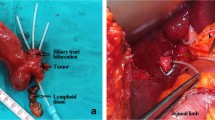Abstract
We reviewed our experience with intrahepatic cholangiojejunostomy as a palliative therapy for patients with unresectable malignant diseases involving the ductal confluence or the common hepatic duct. Fifteen patients with malignant biliary obstruction were treated by cholangiojejunostomy at our hospital. Two patients had intrahepatic cholangiocarcinoma, 7 had gallbladder carcinoma, 5 had bile duct carcionoma, and 1 had pancreatic carcinoma. Segment III cholangiojejunostomies were performed in 14 patients and segment V cholangiojejunostomy in 1. Contraindications for surgical resection were locoregional invasion of tumors involving the proper and/or common hepatic artery and portal vein in 15 patients and the presence of hepatic metastases in 6 patients. Liver metastases were detected in 5 of the 7 patients with gallbladder carcinoma. Postoperative complications occurred in 2 patients (13%), but there was no leakage of the cholangioenteric anastomosis in our series. There was no operative mortality after cholangiojejunostomy. Of the 9 patients who survived for more than 6 months after surgery, 7 showed a significant improvement in performance status (PS) (82 ± 10%) 3 months after the surgery compared with the preoperative PS (70 ± 7%). Four of the 9 patients had recurrent cholangitis as a late complication, but 4 were completely free from jaundice. Median survival after cholangioenteric bypass was 9 months (range, 2–25 months). With respect to tumor location, the median survival time was 4 months (range, 2–25 months) in patients with gallbladder carcinoma and 15.5 months (range, 12–22 months) in those with bile duct carcinoma. While the median survival period after surgery was only 3 months (range, 2 to 8 months) in the 5 patients with hepatic metastases from gallbladder carcinoma, 2 patients without liver metastasis survived for 9 and 25 months after segment III cholangioenteric bypass. In conclusion, cholangiojejunostomy can provide useful palliation for malignant biliary obstruction when combined with careful patient selection.
Similar content being viewed by others
Author information
Authors and Affiliations
Additional information
Received: September 5, 2000 / Accepted: November 8, 2000
About this article
Cite this article
Suzuki, S., Kurachi, K., Yokoi, Y. et al. Intrahepatic cholangiojejunostomy for unresectable malignant biliary tumors with obstructive jaundice. J Hep Bil Pancr Surg 8, 124–129 (2001). https://doi.org/10.1007/s005340170034
Issue Date:
DOI: https://doi.org/10.1007/s005340170034




